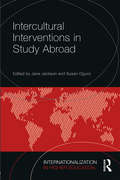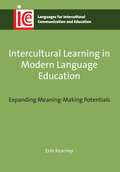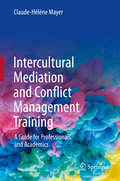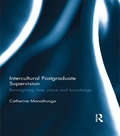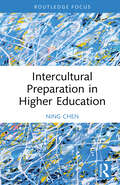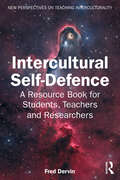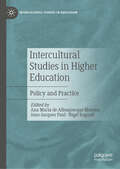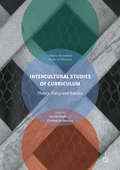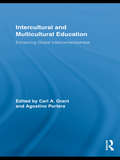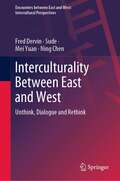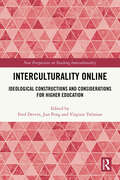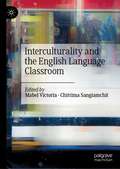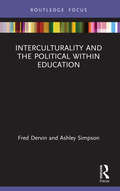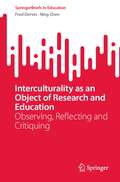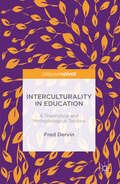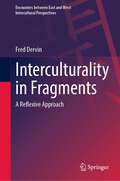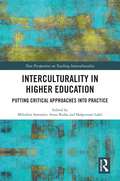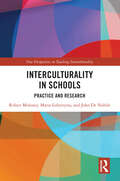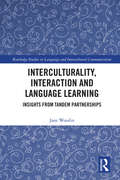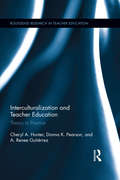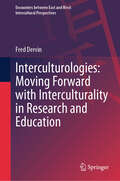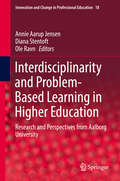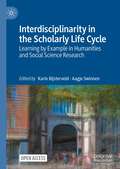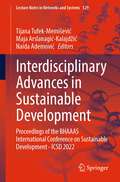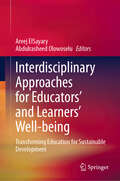- Table View
- List View
Intercultural Interventions in Study Abroad (Internationalization in Higher Education Series)
by Jane Jackson Susan OguroAs a consequence of globalization and internationalization, there has been a dramatic increase in the number and diversity of students who are gaining international educational experience. Making connections between contemporary study abroad research, theory, and practice, Intercultural Interventions in Study Abroad describes innovative programmes that have been designed to deepen the intercultural learning and engagement of student sojourners. In addition to reviewing the benefits and limitations of these interventions, this volume offers recommendations for further enhancements in the field. Exploring examples of intercultural interventions in a wide variety of countries from pre- to post-study abroad, this book helps readers develop a critical awareness of their strengths and limitations, and provides directions for future developments in intercultural pedagogy. Written by intercultural educators and study abroad scholars from different parts of the world, each chapter describes an innovative pedagogical intervention that has been designed to enhance intercultural learning and engagement, including: designing and implementing pre-sojourn intercultural workshops; using guided, critical reflection to deepen students' intercultural learning and engagement; monitoring class interaction to maximize intercultural learning; optimizing intercultural learning and engagement abroad through online mentoring. Truly international in scope, this text is essential for study abroad professionals who seek to enhance the intercultural development, global-mindedness, and second-language learning of students through innovative intercultural programming.
Intercultural Learning in Modern Language Education
by Erin KearneyMany educators aim to engage students in deeply meaningful learning in the language classroom, often facing challenges to connect the students with the culture of the language they are learning. This book aims to demonstrate that substantial intercultural learning can and does occur in the modern language classroom, and explores the features of the classroom that support meaningful culture-in-language-learning. The author argues that transformative modern language education is intimately tied to a view of language learning as an engagement in meaning-making activity, or semiotic practice. The empirical evidence presented is analyzed and then linked to both the theorizing of culture-in-language-teaching and to practical concerns of teaching.
Intercultural Mediation and Conflict Management Training: A Guide for Professionals and Academics
by Claude-Hélène MayerThis book introduces the topic of intercultural mediation and conflict management. Based on the latest scientific research and successful conflict management practices, it provides theoretical insights and practical, self-reflective exercises, role-plays and case studies on conflict, mediation, intercultural mediation, and solution-finding in conflict mediation. The book serves both as a self-learning tool to expand personal competences and cultural sensitivity, and as training material for seminars, workshops, secondary, advanced and higher education and vocational training. It is a valuable contribution to the fields of intercultural conflict mediation and conflict management, intercultural communication, intercultural training and coaching.This is a book about practicing – the applied practice of competent conflict crafts in diverse intercultural contexts. Conflict practitioners, mediators, and intercultural trainers would be inspired by Professor Claude-Hélène Mayer’s creative integration of relevant intercultural models with do-able conflict strategies and in reaching intergroup harmony with reflexivity and cultural resonance.--- Professor Stella Ting-Toomey, Human Communication Studies, California State University at Fullerton, USA, and Co-Editor of The SAGE Handbook of Conflict Communication, 2eGiven the difficulty and complexity of successful intercultural collaboration and conflict mediation, this is a much-needed addition to cross-cultural positive psychology. It is rich in content and training. I highly recommend it for teaching, corporate training, and for executive coaches.--- Professor Paul T.P. Wong, President International Network on Personal Meaning and President Meaning-Centered Counselling Institute, Toronto, CanadaIntercultural conflict resolution is a critically important task in this modern world. This book by Professor Mayer is a welcome handbook on how to use mediation to resolve those conflicts. It should be in the library of every conflict mediator. My congratulations to Professor Mayer for her important work.--- Dan Landis, Founding President, International Academy of Intercultural Research, Affiliate Professor of Psychology, University of Hawaii
Intercultural Postgraduate Supervision: Reimagining time, place and knowledge
by Catherine ManathungaThe impact of globalisation and aggressive marketing by universities has increased the flow of international or culturally diverse students enrolling in postgraduate research degree programs outside their own countries. As access to postgraduate education widens, more local culturally diverse and Indigenous students are also enrolling in higher degree studies. As a result, significantly more academics now engage in intercultural supervision or supervising students who are culturally different to themselves. This book argues that empowering intercultural supervision can result from more nuanced, critical and theoretically-based understandings of time, place and knowledge. It shows how a range of ‘Southern’ theories (including postcolonial, Indigenous, feminist, social and cultural geography theories) about history, geography and knowledge can offer fresh insights into intercultural supervision. The author suggests that by using the conceptual tools offered by these Southern theories, the more complex but potentially rich aspects of intercultural supervision can be better understood and grappled with. In particular, these theories enable us to challenge assumptions about the universality and timelessness of Northern knowledge, and to create space for the recovery and further development of Southern, Eastern and Indigenous knowledges within intercultural supervision. This book will be of value to academic supervisors and postgraduate students, especially those engaged in intercultural supervision, as well as researchers and scholars in the field of higher education.
Intercultural Preparation in Higher Education (New Perspectives on Teaching Interculturality)
by Ning ChenIntercultural Preparation in Higher Education critically examines the complexities of intercultural preparation, challenging reductionist, competence-based approaches and emphasising critical reflection, linguistic sensitivity and intersectional perspectives, which offer transformative insight.This concise yet comprehensive book draws on the author's extensive experience in preparing students and educators for diversity and intercultural engagement within Chinese and Finnish higher education – two distinct yet interconnected settings. Chen advocates for reflexive, context-sensitive frameworks that address power dynamics, ideological influences and epistemic inequalities shaping intercultural encounters. Synthesising global and Chinese research, the author deconstructs interculturality as an ideological construct and proposes expanding it to encompass diverse diversities. Through case studies of Chinese Minzu education, Finnish teacher training and China's mental health and well-being education, the author explores how to equip educators and students for glocalised (global + local) realities. The book argues that mental health education in China, for instance, can redefine interculturality beyond 'international' or 'ethnic' binaries. By interrogating dominant paradigms and proposing equitable alternatives, the author advances a balanced and inclusive vision of preparation for all in higher education and beyond.The title is designed for educators, researchers, students and practitioners interested in intercultural studies, higher education, as well as internationalisation and globalisation.
Intercultural Self-Defence: A Resource Book for Students, Teachers and Researchers (New Perspectives on Teaching Interculturality)
by Fred DervinBased on the author’s 25 years of experience in researching and teaching interculturality, Intercultural Self-Defence: A Resource Book for Students, Teachers and Researchers is a compelling exploration of the subtle forces that shape Intercultural Communication Education and Research (ICER).The Resource Book delves into the adversaries lurking within ICER - indoctrination, intellectual inertia and linguistic indifference - and unveils how they can stifle genuine understanding and growth. Each chapter acts as a critical lens, scrutinising the boundaries between education and indoctrination, the stagnation of thought and the perils of linguistic complacency. The author illustrates the impact of these forces on interculturality and the ethical implications they carry. The book contains a series of activities designed to encourage creative self-reflection and fosters a deeper understanding of the interplay between language, power and interculturality. But it is more than a resource: It is a manifesto for continuous learning, active engagement and the pursuit of a more inclusive and dynamic field of intercultural communication education and scholarship.Advocating a vigilant and self-reflexive approach, the book will serve as a critical guide for students, teachers and researchers specialising in intercultural research and education to navigate the complexities of interculturality.
Intercultural Studies in Higher Education: Policy and Practice (Intercultural Studies in Education)
by Nigel Bagnall Ana Maria de Albuquerque Moreira Jean-Jacques PaulThis book explores the study of policies and practices in Higher Education by comparing systems, institutions, programs, innovations, results and cultures. In a rapidly changing global and international marketplace, the growth of higher education has occurred within distinct cultural contexts, meaning that change is reflected within local, regional, national and global perspectives. Using a single data methodology across countries and continents, the editors and contributors explore higher education reforms between global and local dimensions, the expansion of access and democratisation, and relevant aspects in the organisation and management of higher education. In doing so, this book arrives at an understanding of higher education at a truly intercultural level, which can lead to a deeper and more holistic understanding of policies and practices in higher education. This innovative book will be of interest and value to students and scholars of higher education across the world as well as the study of interculturality.
Intercultural Studies of Curriculum
by Carmel Roofe Christopher BezzinaThis book explores the philosophical, ideological and practical dimensions of curriculum using an intercultural lens. It is cross-cultural, comparative and inclusive, with each chapter featuring case studies from a minimum of three countries across different continents. By using the same methods of data collection and analysis for each country level in each chapter, the text explores relationships of curriculum theory, policy and practice both within and between countries. A diverse range of themes are explored, including; social justice and teacher preparation curriculum, language education curriculum, early childhood education and music, curriculum as praxis, curriculum and globalisation, science curriculum, teacher leadership in curriculum implementation, as well as curriculum and history. The exploration of these themes lay the foundation for open dialogue and innovative approaches in exploring curriculum issues within, between and across cultures and contexts.
Intercultural and Multicultural Education: Enhancing Global Interconnectedness (Routledge Research in Education)
by Carl A. GrantBy addressing intercultural and multicultural education in a global context, this volume brings together the dynamic discussions and lively debate of intercultural and multicultural education taking place across the world. Not content with discussion of theory or practice at the expense of the other, this collection of essays embodies dialogical praxis by weaving together a variety of epistemologies, ideologies, historical circumstances, pedagogies, policy approaches, curricula, and personal narratives. Contributors take readers to the countries, schools, and nongovernmental agencies where intercultural education and multicultural education, either collectively or singularly, are active (often central) concepts or practices in the daily educational undertaking and discourse of society. Readers are also informed about how intercultural education and/or multicultural education within a country came to be and will learn about the debates over intercultural education and/or multicultural education at both the government and local level.
Interculturality Between East and West: Unthink, Dialogue and Rethink (Encounters between East and West)
by Fred Dervin Sude Mei Yuan Ning ChenThis book urges readers to develop a radical capacity to unthink and rethink interculturality, through multiple, pluri-perspectival and honest dialogues between the authors, and their students. This book does not give interculturality a normative scaffolding but envisages it differently by identifying some of its polyphonic textures. China’s rich engagement with interculturality serves to support the importance of being curious about other ways of thinking about the notion beyond the ‘West’ only. As such, the issues of culture, identity, language, translation, intercultural competence and silent transformations (amongst others) are re-evaluated in a different light. This is a highly informative and carefully presented book, providing scientific insights for readers with an interest in interculturality.
Interculturality Online: Ideological Constructions and Considerations for Higher Education (New Perspectives on Teaching Interculturality)
by Fred Dervin Jun Peng Virginie TrémionThe contested and polysemic concept of ideology has been used only marginally in research on intercultural communication education. This edited volume focuses on the ideological dimensions of online interculturality in higher education, encompassing areas such as telecollaboration, virtual classrooms and online teacher professional development.The chapter authors explore the intercultural engagements, perceptions and experiences of students, teachers and researchers in different parts of the world, including Australia, China, Finland, France, Germany, Indonesia, Japan, Mexico, New Zealand, Spain and the USA. In doing so, they aim to contribute to the current critical and reflexive turn in research and teaching that is examining global socio-economic, political and linguistic inequalities and imbalances of power. Using concrete examples from their own practices, the chapter authors critically and reflexively problematise 'doing' interculturality in higher education by identifying, engaging with, reflecting on and revising ideologies of online interculturality. By intersecting interculturality, technology and ideology, this book also makes a critical contribution to the literature on the internationalisation of higher education and its digitalisation.Written in a globally friendly and engaging style, the book will appeal to academics and students of intercultural communication education in online environments.
Interculturality and the English Language Classroom
by Mabel Victoria Chittima SangiamchitThis book examines the concept of interculturality in English Language Teaching (ELT), using examples from diverse international and educational settings to demonstrate different approaches. Increased contact between multilingual speakers from different cultural backgrounds means that linguistic and intercultural competence must be taught hand in hand, and the approaches featured here will: encourage learners to develop intercultural sensitivity and a critical intercultural attitude; mitigate the limitations of textbooks and extend the learning to global issues, intercultural citizenship, and media literacy; show the potential of telecollaboration and popular culture as pedagogical resources; and demonstrate the value of interculturality in English as lingua franca situations and English for Academic Purposes. The chapters feature empirical studies from around the world, and include questions for reflection and recommended reading so that readers can engage more closely with key concepts, compare and adapt the practices most relevant to them. This book contributes to the literature on (inter)cultural pedagogy, English as a lingua franca, language pedagogy, and teacher professional development, and will be an invaluable tool for English language teachers, teacher trainers and educators seeking to enrich their practice. It will also be of interest to students and scholars of Applied Linguistics, especially language education.
Interculturality and the Political within Education (Routledge Research in Education)
by Fred Dervin Ashley SimpsonThis innovative book problematises the internal relationships within and between the intercultural and the political in education. It engages in a critical dialogue with current practices and discourses, and the focus on ‘the political’ offers an alternative trajectory to explore interculturality within education. Drawing on international research and consolidated with application of top interdisciplinary theories in the field, Dervin and Simpson alert us to the current dangers of treating interculturality loosely in education. The authors engage in a dialogue to encourage readers to examine the meaning of interculturality and the state of research in education today, suggesting that we move beyond merely rehearsing theories, concepts and methods. More importantly they urge researchers, teachers and students to question Western-centric ideologies of interculturality. Intercultural and the Political Within Education is a must read for those who are dissatisfied with current intercultural research and education. It will be of great interest to researchers and students of the philosophy of education and those interested in the contemporary debates concerning ideologies, definitions and ownership of interculturality.
Interculturality as an Object of Research and Education: Observing, Reflecting and Critiquing (SpringerBriefs in Education)
by Fred Dervin Ning ChenThis book proposes a new method for working on the complex and polysemic notion of interculturality, aimed at scholars, students and educators who have an interest in enriching and challenging their own take on this somewhat controversial scientific notion. Multiple examples of observability made by the authors are provided to illustrate the method. The book helps readers to look at themselves as ‘producers’, ‘consumers’ and ‘promoters’ of selected knowledge of interculturality. This book represents an original contribution to the field, by introducing the importance of observation and reflexivity in building up varied epistemic engagements with the notion of interculturality.
Interculturality in Education
by Fred DervinThis book explores the decades-long use of the notion of interculturality in education and other fields, arguing that it is now time to move beyond certain assumptions towards a richer and more realistic understanding of the 'intercultural'. Many concepts such as culture, identity and intercultural competence are discussed and revised. Myths about interculturality are also unpacked and dispelled. Written by one of the leading scholars in the field, this book proposes a very useful framework to address theoretical and methodological issues related to interculturality. This somewhat provocative book will be of interest to anyone who wrestles with this knotty but central notion of our times.
Interculturality in Fragments: A Reflexive Approach (Encounters between East and West)
by Fred DervinThis book continues the author’s long-term reflections (over 20 years of scholarship and experience in intercultural communication education) around the fascinating and yet contestable notion of interculturality in education. As an unstable and polysemic notion, interculturality deserves to be opened up again and again and there is a need to engage with it continuously, observing, critiquing and problematizing its complexities. This book urges researchers, students and interculturalists to take the time to think carefully and deeply about interculturality and to find inspiration beyond the dominating ‘Western’ ideological world of intercultural research and education. This book starts from short fragments written by the author for himself over a period of one year. In these short statements and notes about interculturality, the author reflects creatively on the questions he had in mind at the time of writing and offers some (temporary) answers, which, in turn, are questioned and revised. Over the 1000 fragments that the author wrote, he selected about 100, for which he wrote commentaries, referring to and reviewing current research and debates on interculturality in the process. One of the specificities of the book is to be highly multidisciplinary to help us get used to looking for inspiration in other fields of research and creativity. The fragments can be read randomly – the reader may open the book at any page and pick any fragment. The author suggests reading each individual fragment first and then the accompanying explanatory texts. While reading them, the reader is also invited to reflect on any potential addition to what the author wrote – anything they might dis-/agree with, anything they would have wanted to discuss with the author. Questions have been added at the end of each chapter for readers to reflect on and to enrich their own criticality and reflexivity. The book serves as continuous guidance for engaging with interculturality.
Interculturality in Higher Education: Putting Critical Approaches into Practice (New Perspectives on Teaching Interculturality)
by Sommier MélodineEngaging with the topic of critical intercultural education at tertiary level, the book aims to strengthen what critical intercultural communication means and facilitate its implementation in higher education classrooms. With contributors coming from a variety of educational contexts and disciplines, the book provides a versatile and comprehensive picture of how intercultural communication can be approached in different fields. By offering a reflection on theoretical frameworks for teaching and learning critical intercultural communication, it bridges the gap between theory and practice in recent years. Furthermore, it proposes concrete pedagogical solutions that will help educators working at the tertiary level move from essentialist approaches to meaningful intercultural education. Higher education teachers, lecturers and professors responsible for the design and delivery of teaching on intercultural communication will find this book helpful and resourceful.
Interculturality in Schools: Practice and Research (New Perspectives on Teaching Interculturality)
by Robyn Moloney Maria Lobytsyna John De NobileThis book provides a comprehensive study of professional learning courses in intercultural settings, exploring how this impacts teachers and brings about change in classrooms, culture across schools as a whole, and children’s lives. The authors argue that teachers and schools must raise the stakes globally in an intercultural practice grounded in educational equity and anti-racism. Identifying the attributes that make a difference in teacher intercultural learning and change through analysis of both quantitative and qualitative data, the study throws up marked tensions and contradictions between the desire to explore both an abstract personal concept and achieve practical outcomes in schools. As case studies of two primary schools dig deep into teachers’ lives, the book proposes a model of personal teacher interculturality which is constructed from the inside out. The potential of neglected spaces in schools for intercultural identity is also highlighted by images of new practice. This book is a supportive resource for schools or educational institutions, in any global context, that are seeking a fresh approach to intercultural education and holistic change.
Interculturality, Interaction and Language Learning: Insights from Tandem Partnerships (Routledge Studies in Language and Intercultural Communication)
by Jane WoodinThis book opens up new lines of debate in language learning and intercultural communication through an investigation of tandem language learning (a method of language learning based on mutual language exchange between native speakers and learners of each other’s language) in connection with intercultural learning and identity construction. Through an empirical study of face-to-face tandem conversations, Jane Woodin provides compelling evidence for the re-definition of the tandem partnership beyond the traditional native speaker–non-native speaker (NS-NNS) paradigm. By analyzing conversation shapes, learner identification of self and other and interactants’ own focus on culture, this book reveals how interactants themselves address the complexities of language, learning, ownership and meaning. The book also questions the prevalence of models of intercultural competence which describe the competence of the individual, with little recognition of the role of the relationship or interaction. Woodin considers the broader applicability of the tandem framework of autonomy and reciprocity, and suggests new directions for further research on tandem learning.
Interculturalization and Teacher Education: Theory to Practice (Routledge Research in Teacher Education #2)
by Cheryl Hunter Donna PearsonInstitutions of higher education are keen to improve teachers’ intercultural experiences, communication, and understanding, but offer few resources for bringing the research literature to direct application in teacher education programs. This volume addresses that gap by examining what intercultural exchanges in teacher education look like, why they are important, and how they can be maintained. The authors examine how socio-cultural beliefs, institutional structures, and external accreditation bodies interact in the process of interculturalization, highlighting the incentives and barriers as well as strategies to implement and maintain interculturalization projects. Highlighting pragmatic examples, this book addresses the challenges and benefits of interculturalization that can be applied to teacher education programs from both a theoretical and practitioner perspective.
Interculturologies: Moving Forward with Interculturality in Research and Education (Encounters between East and West)
by Fred DervinThis book showcases 100 terms related to the scientific, educational and political notion of interculturality. Each term is presented with its specific multilingual discussions, scientific origins, multifaceted content, and short reviews of the global literature in English. Some myths, imaginaries and ideologies (‘interculturologies’ in the book) that they have led to construct are also introduced. Questions at the end of each entry encourage readers to think further regarding the notion of interculturality in research and education. Based on the author's decades-long experience in researching and teaching in the interdisciplinary field of intercultural communication education in different parts of the world, his constant reflexive and critical engagement with the notion of interculturality, and in-depth reviews of current research, the author has carefully selected (recurrent) concepts, notions, and ideas to be deconstructed in order to challenge readers to think further with him, especially beyond ‘Western’ and certain static and resistant ideological positions. These represent a complex body of concepts and notions, but also involve myths and imaginaries that can prevent us from moving forward in our thinking and in acting interculturally in research and education. This book serves as a reading guide for further interculturologies that the reader might identify in the future or as they engage with the book.
Interdisciplinarity and Problem-Based Learning in Higher Education: Research and Perspectives from Aalborg University (Innovation and Change in Professional Education #18)
by Ole Ravn Annie Aarup Jensen Diana StentoftThis book addresses the relation between Problem-Based Learning (PBL) and interdisciplinarity and challenges the often implicit assumption that PBL leads to interdisciplinarity by default. The book examines theoretical and philosophical aspects of PBL and interdisciplinary learning. The first part of the book conceptualises the notions of problem-based learning and interdisciplinary learning, and highlights some key overlaps and ways of conceiving of their interrelatedness. It discusses the role of problem-based medical education in relation to interdisciplinary professionalism in medical education. Taking the reader into the realm of techno-anthropology, the book discusses the role of problems and projects in transgressing disciplines, and presents an analysis of three challenges facing new students when entering interdisciplinary and problem-based higher education. The second part of the book focuses on practicing interdisciplinarity in problem-based higher education. It explores how the construction of problems in interdisciplinary PBL projects can be seen from the perspectives of multicultural groups, and examines group processes in interdisciplinary PBL projects. It concludes by taking a closer look at student practices in interdisciplinary PBL, and at how students are positioned and position themselves in the complex transdisciplinary PBL project.
Interdisciplinarity in the Scholarly Life Cycle: Learning by Example in Humanities and Social Science Research
by Karin Bijsterveld Aagje SwinnenThis open access book illustrates how interdisciplinary research develops over the lifetime of a scholar: not in a single project, but as an attitude that trickles down, or spirals up, into research. This book presents how interdisciplinary work has inspired shifts in how the contributors read, value concepts, critically combine methods, cope with knowledge hierarchies, write in style, and collaborate. Drawing on extensive examples from the humanities and social sciences, the editors and chapter authors show how they started, tried to open up, dealt with inconsistencies, had to adapt, and ultimately learned and grew as researchers. The book offers valuable insights into the conditions and complexities present for interdisciplinary research to be successful in an academic setting.This is an open access book.
Interdisciplinary Advances in Sustainable Development: Proceedings of the BHAAAS International Conference on Sustainable Development -ICSD 2022 (Lecture Notes in Networks and Systems #529)
by Naida Ademović Tijana Tufek-Memišević Maja Arslanagić-KalajdžićThis book presents interdisciplinary research and scientific outcomes in sustainable development acquired from the BHAAAS International Conference on Sustainable Development-ICSD2022 as part of the 13th Days of Bosnian-Herzegovinian American Academy of Arts and Sciences held in Sarajevo, June 23-26, 2022. The main event enabled researchers and experts from 25 countries to exchange their knowledge, ideas and experiences. The general scope of the book includes topics presented at three specialized symposia: The Quadruple Helix Approach, Sustainable Urban Development and Sustainable Civil Engineering with research topics ranging from SDGs, sustainable development education, environmental and social responsibility and consumption to sustainable retrofit strategies, urban heritage conservation, urban mobility, Space Syntax analysis, watercourse recovery, railway corridors and more. The book is recommended for fellow researchers, professionals, and students in the fields of economy, politics, architecture, urban planning, civil engineering and related fields.
Interdisciplinary Approaches for Educators' and Learners’ Well-being: Transforming Education for Sustainable Development
by Areej ElSayary Abdulrasheed OlowoseluThis book bridges knowledge gaps by exploring transformative approaches for sustainable development to ensure high-quality and positive education and increase educators' and learners’ well-being. It offers research findings, best practices, case studies and empirical research. The work inspires and guides educators in implementing effective strategies by means of interdisciplinary approaches. It is a valuable resource supporting ongoing professional development for teachers and educational leaders, enhancing pedagogical strategies, curriculum design and a safe positive educational environment. Additionally, it addresses global challenges in education, fostering a broader discourse on education's role in promoting interdisciplinary approaches, sustainable development, and well-being for a more inclusive future.
